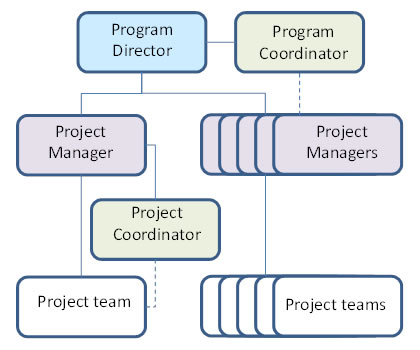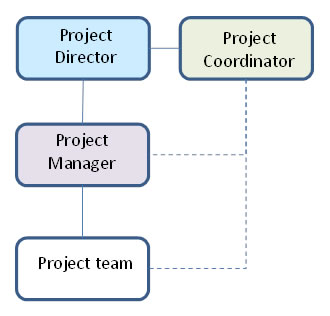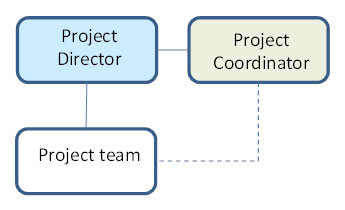What’s the difference and what do you need?
There are many definitions of project management available to describe the profession and the elements involved in managing projects. What is really important for timely and successful project delivery is getting the right people in the right roles for each specific project and program.
Mature project organisations and executives with a good track record of project accountability use the following complementary roles in different combinations to achieve good project outcomes cost effectively. Some effective combinations used in practice are illustrated on the following page.
- Project Director
- Project Manager
- Project Coordinator or Project Officer
- Program Director
- Program Coordinator or Program Officer
The Project Director role is a true leadership role, generally operating at a strategic and tactical level. This role is expected to understand the broader context of the organisation, the many changes being undertaken beyond the program and the direct operational area, and align the project approach, impact and timing with the broader environment. This role generally is undertaken by a highly experienced project leader with implementation experience who provides advisory services to the client management team in relation to the project approach and integration with broader activities. The Project Director needs little direction and supervision from the executive team. They provide leadership, direction, guidance and coaching to the Project Manager and the broader project team in relation to project approach, activities, risks, issues and general management. They manage upwards strategically to facilitate effective executive and Project Board governance. Governance is only as good as the quality and nature of information provided upwards from the project.
The Project Managerrole is more of a management role, generally implementing defined plans and agreed approaches as set out, without the responsibility of strong tailoring and ongoing refinement. Generally the project manager maintains a gantt chart of tasks and tracks progress against that plan, and completes template management documents such as Project Plan or Project Initiation Document, regular status reports and Project Closure documents. They often need executive guidance, review and coaching and refinement of documentation after initial drafting, such as from a Program or Project Director or from operational management per the assigned reporting line.
The Project Coordinator or Project Officer role is a valuable administrative and management support role for project teams overall. They are generally very flexible roles that not only support project management activities, but can also support any or all project team members to undertake specialist project content activities, particularly those that require detailed or time consuming tracking or repetitive tasks that are quite straight forward once the initial planning and set up has been completed. Projects that require teams to travel see great value in such a role to support the logistics of travel arrangements and a travelling team.
Program level roles are similar in nature to the project level roles described, but with a whole of program focus and accountability rather than individual project accountability.
Following are some combinations of roles that I have seen work well in practice to optimise the skills mix, coaching and guidance cost effectively, whilst driving projects through fast completion, effectively managing impacts on stakeholders and risk. Faster project completion under strong and experienced leadership effectively controls the overall project costs through shorter project durations - the full project team daily "burn" rate cost is incurred for a shorter period through the experience of leadership roles.

This mix was used for an ICT program that overall had a high risk of executive and user impacts and was business critical. The project managers were technical and provided excellent technical management. Their skills were supplemented by the Program Director providing strong leadership at a program level in the areas of implementation approach guidance, executive stakeholder management, business impact and risk assessment and management and organisational change management.

This mix was valuable for large and complex projects where the day to day tracking and management was substantial and time-consuming, requiring a Project Manager to focus on the day to day management, while the Project Director maintained the strategic connections and managed stakeholders effectively. Administration activities and the extent of project activities can justify a Project Coordinator role in addition to the Project Director and Project Manager roles. It is also a valid combination when the Project Director is not a ‘hands on’ type of leader.

This mix was very cost effective to drive complex projects with significant business impact and risk, where the Project Director is a ‘hands on’ Project Director and is happy to be supported by a Project Coordinator without a Project Manager in place.
